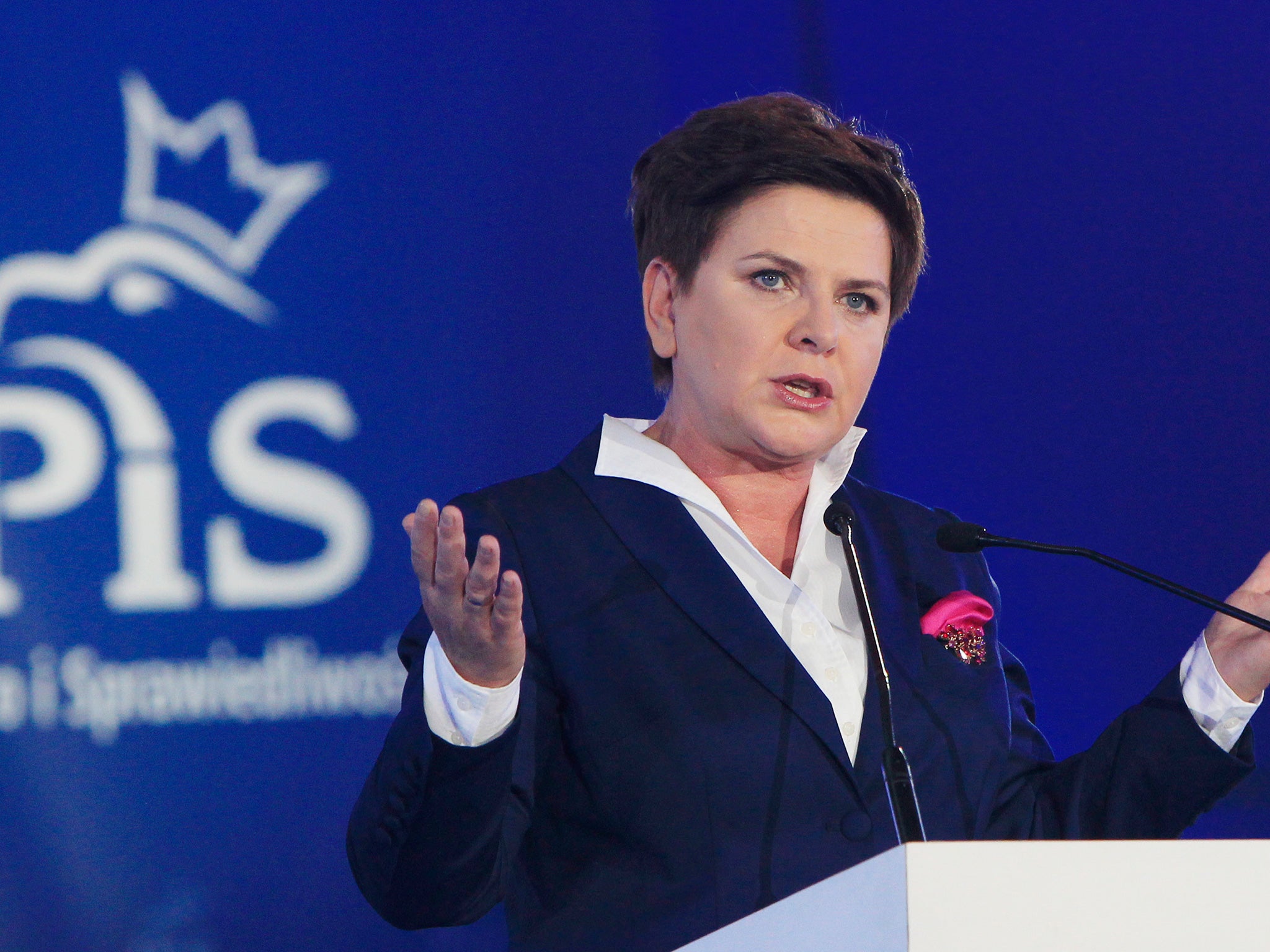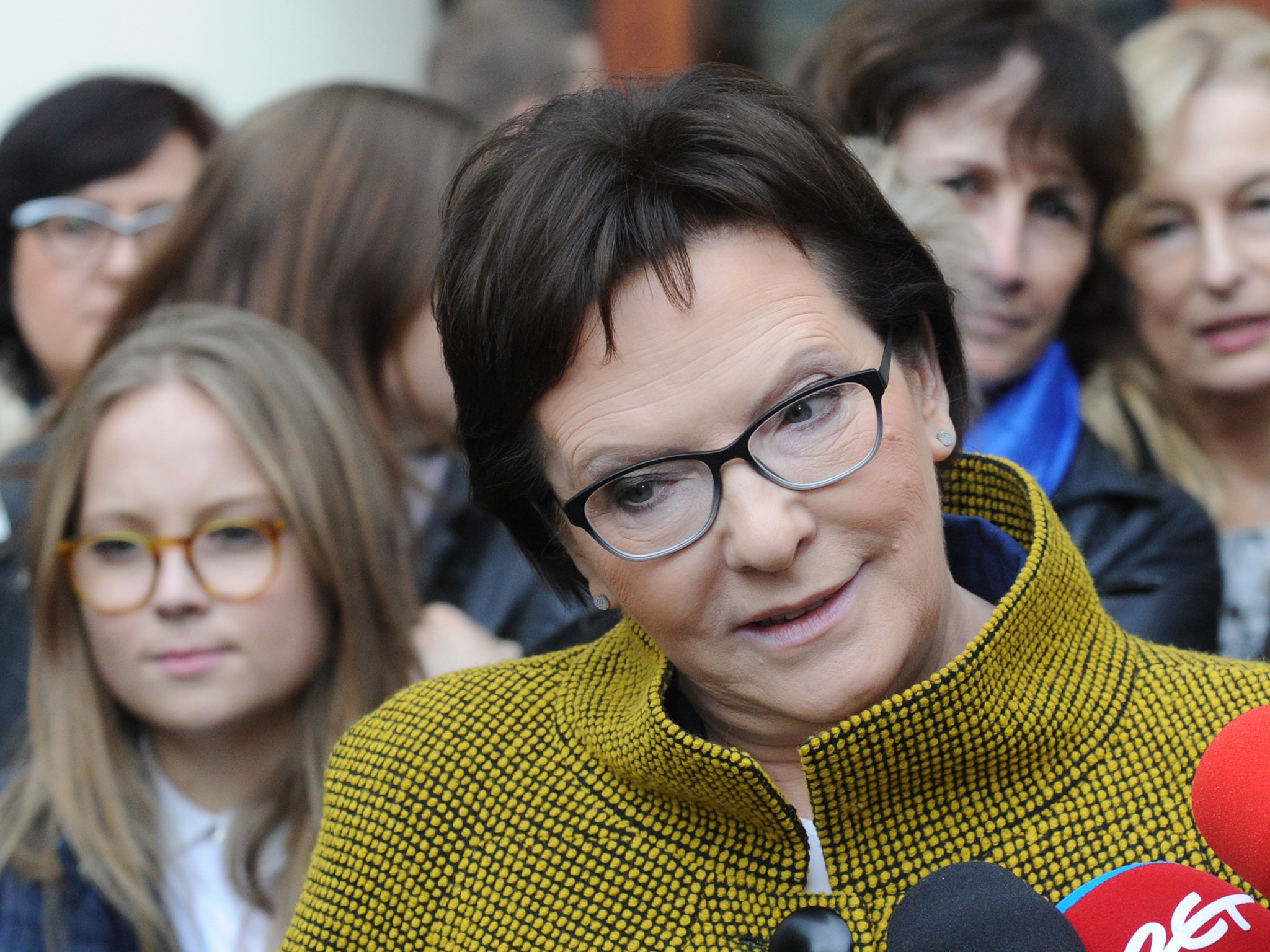Poland election: Eurosceptic party leads polls as voters lose patience with government
The centrist Civic Platform led by the Prime Minster, Ewa Kopacz, which has been in power since 2007, is expected to be ousted by the national-conservative Law and Justice party of Beata Szydlo

Your support helps us to tell the story
From reproductive rights to climate change to Big Tech, The Independent is on the ground when the story is developing. Whether it's investigating the financials of Elon Musk's pro-Trump PAC or producing our latest documentary, 'The A Word', which shines a light on the American women fighting for reproductive rights, we know how important it is to parse out the facts from the messaging.
At such a critical moment in US history, we need reporters on the ground. Your donation allows us to keep sending journalists to speak to both sides of the story.
The Independent is trusted by Americans across the entire political spectrum. And unlike many other quality news outlets, we choose not to lock Americans out of our reporting and analysis with paywalls. We believe quality journalism should be available to everyone, paid for by those who can afford it.
Your support makes all the difference.There are two sides to Poland. One is represented by the pristine new trains and office buildings created by an economy that has grown to become the sixth-largest in the EU. The other by crumbling farmhouses and tower blocks covered in graffiti, with one in five young people unemployed.
On Sunday, these two sides will come together as the nation of 38 million goes to the ballot box.
Polls indicate that the centrist Civic Platform (PO) led by the Prime Minster, Ewa Kopacz, which has been in power since 2007, will be ousted by the national-conservative Law and Justice (PiS) party of Beata Szydlo.

Last year, PO’s slick leader, and the former Prime Minister, Donald Tusk left to become President of the European Council, and Ms Kopacz has been an uncharismatic replacement. Voters defecting from PO say it has not achieved its campaign pledges to modernise the state, make progressive social reforms, cut red tape or reduce the size of the public sector. Of the 10 biggest companies, seven are state-controlled.
The government, meanwhile, has also been dogged by controversy. The worst was a bugging scandal last year, which involved secret recordings in exclusive Warsaw restaurants where cabinet ministers were dining and allegedly using foul language. For hardworking voters with traditional values, the privilege and hypocrisy of the capital never felt further away.
PiS is benefitting from this fatigue with the establishment. “It’s time to put an end to a policy of development that benefits only 10 per cent of the people. It is time for us all to benefit,” Ms Szydlo told a party conference.
She has promised to protect miners’ jobs, increase the minimum wage, raise personal tax allowance, increase child benefit, reduce the retirement age and impose taxes on major shops and banks.
It’s time to put an end to a policy of development that benefits only 10 per cent of the people. It is time for us all to benefit
However, PiS faces a number of battles over its foreign policy. It wants to raise defence spending in response to Russia, fight EU federalism, stay outside the euro, and stand up to Germany on emissions and the influx of hundreds of thousands of refugees arriving this year.
The last nail in PO’s coffin was Ms Kopacz’s decision to defy a large section of public opinion and side with Chancellor Angela Merkel on refugee quotas. Seizing the opportunity, PiS’s chairman, Jaroslaw Kaczynski, said migrants had brought “all sorts of parasites and protozoa, which... while not dangerous in the bodies of these people, could be dangerous here”. It seems, in this country of contradictions, that mistrust is never far away.
Mr Kaczynski served as Prime Minister from 2006 to 2007, while his twin brother Lech was President, Poland’s largely ceremonial head-of-state. Liberal media dubbed the former child stars the “Terrible Twins” after their unfriendly remarks about Germany. And when the President was killed in a plane crash in Russia in 2010, Mr Kaczynski suggested his brother was assassinated. Regaining power, he has long argued, would give him a chance to investigate more thoroughly his death and the nearly 100 others who perished in the plane crash.
For her part, Ms Szydlo is a coal miner’s daughter who studied ethnography at the prestigious Jagiellonian University in Krakow. Her role has been to soften the party image and to target disillusioned young people, who hardly remember a PiS government. It worked in the spring, when she ran the successful election campaign ousing the photogenic PiS president, Andrzej Duda, whose wife has Jewish roots and is a German-language teacher.
Within the PiS, Mr Kaczynski has always been seen as the strategist, while his brother took on more public roles. Pundits now say Ms Szydlo may be Mr Kaczynski’s puppet, to be controlled or even replaced by him if the election is won. That is seemingly how he became the Prime Minister in 2006, after positioning a backbencher as PM for just eight months. Sunday’s election could see the return of a Terrible Twin.
Join our commenting forum
Join thought-provoking conversations, follow other Independent readers and see their replies
Comments